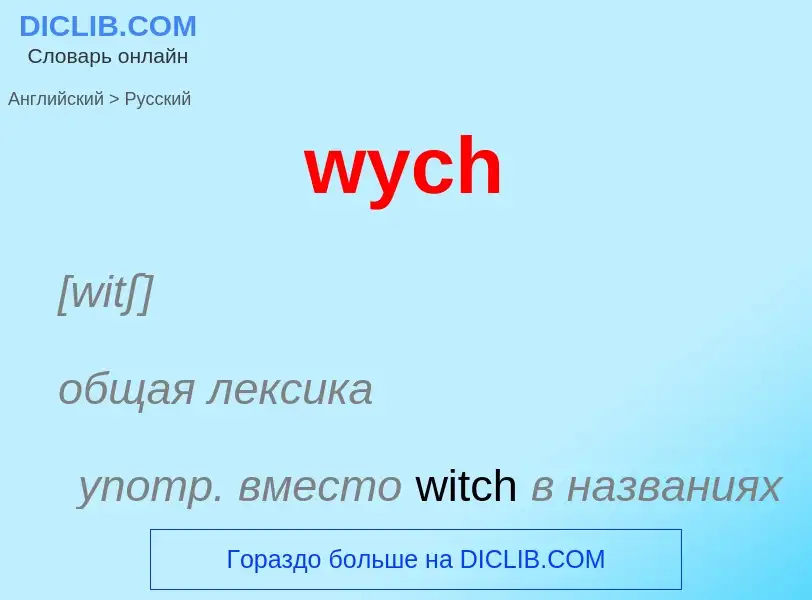Перевод и анализ слов искусственным интеллектом ChatGPT
На этой странице Вы можете получить подробный анализ слова или словосочетания, произведенный с помощью лучшей на сегодняшний день технологии искусственного интеллекта:
- как употребляется слово
- частота употребления
- используется оно чаще в устной или письменной речи
- варианты перевода слова
- примеры употребления (несколько фраз с переводом)
- этимология
wych - перевод на русский
[witʃ]
общая лексика
употр. вместо witch в названиях растений
['witʃelm]
существительное
ботаника
ильм горный
вяз шершавый (Ulmus glabra)
ильм горный или шершавый
Определение
Википедия

Salt, also referred to as table salt or by its chemical formula NaCl (sodium chloride), is an ionic compound made of sodium and chloride ions. All life depends on its chemical properties to survive. It has been used by humans for thousands of years, from food preservation to seasoning. Salt's ability to preserve food was a founding contributor to the development of civilization. It helped eliminate dependence on seasonal availability of food, and made it possible to transport food over large distances. However, salt was often difficult to obtain, so it was a highly valued trade item, and was considered a form of currency by certain people. Many salt roads, such as the via Salaria in Italy, had been established by the Bronze Age.
All through history, availability of salt has been pivotal to civilization. In Britain, the suffix "-wich" in a place name sometimes means it was once a source of salt, as in Northwich and Droitwich, although other - wich towns are so named from the Saxon 'wic', meaning fortified dwelling or emporium. The Natron Valley was a key region that supported the Egyptian Empire to its north, because it supplied it with a kind of salt that came to be called by its name, natron. Today, salt is almost universally accessible, relatively cheap, and often iodized.


![Ancient method of boiling brine into pure salt in [[China]] Ancient method of boiling brine into pure salt in [[China]]](https://commons.wikimedia.org/wiki/Special:FilePath/Image-Zigong Salt.jpg?width=200)

![The [[Sečovlje Saltworks]] on the Northern [[Adriatic Sea]] were probably started in Antiquity and were first mentioned in 804 in the document on ''[[Placitum of Riziano]]''. The [[Sečovlje Saltworks]] on the Northern [[Adriatic Sea]] were probably started in Antiquity and were first mentioned in 804 in the document on ''[[Placitum of Riziano]]''.](https://commons.wikimedia.org/wiki/Special:FilePath/Secoveljske soline - Lera3.jpg?width=200)
![Vertical [[derrick]]s and drilling rig from Qing dynasty [[Zigong]], China extracting brine from deep underground wells. Vertical [[derrick]]s and drilling rig from Qing dynasty [[Zigong]], China extracting brine from deep underground wells.](https://commons.wikimedia.org/wiki/Special:FilePath/ZigongSaltwells.jpg?width=200)
![A 'zouthuisje', i.e. little salt-house, used for salt making today. Many of these structures can be found near [[Twekkelo]] in [[Twente]], the [[Netherlands]]. A 'zouthuisje', i.e. little salt-house, used for salt making today. Many of these structures can be found near [[Twekkelo]] in [[Twente]], the [[Netherlands]].](https://commons.wikimedia.org/wiki/Special:FilePath/Zouthuisje bij Twekkelo.jpg?width=200)
.jpg?width=200)
![Ancient ''U. glabra'' in [[Styria]], Austria Ancient ''U. glabra'' in [[Styria]], Austria](https://commons.wikimedia.org/wiki/Special:FilePath/ID 1481 Bergulme 001.jpg?width=200)

![Wych near [[Castle Douglas]], [[Galloway]], late April Wych near [[Castle Douglas]], [[Galloway]], late April](https://commons.wikimedia.org/wiki/Special:FilePath/Wych Elm in Bloom - geograph.org.uk - 1277831.jpg?width=200)
![Wych, Scandale Beck, [[Cumbria]], May Wych, Scandale Beck, [[Cumbria]], May](https://commons.wikimedia.org/wiki/Special:FilePath/Elm, Scandale Beck - geograph.org.uk - 1883123.jpg?width=200)
.jpg?width=200)





.jpg?width=200)
![Seedling, showing [[cotyledon]]s (K) Seedling, showing [[cotyledon]]s (K)](https://commons.wikimedia.org/wiki/Special:FilePath/Klijavac ulmus glabra goc 0427.jpg?width=200)
![The Meadows]], Edinburgh, 1989 The Meadows]], Edinburgh, 1989](https://commons.wikimedia.org/wiki/Special:FilePath/Edin-Meadows 10A.jpg?width=200)
.jpg?width=200)

.jpg?width=200)
. Middle Meadows Walk, Edinburgh.jpg?width=200)
. Learmonth Gardens, Edinburgh (2).jpg?width=200)
![''Ulmus glabra'' Huds., [[Pelhřimov]], Czech Republic, 2017 ''Ulmus glabra'' Huds., [[Pelhřimov]], Czech Republic, 2017](https://commons.wikimedia.org/wiki/Special:FilePath/Pelhřimov, jilm horský 2. celek jih.jpg?width=200)



.jpg?width=200)



![''U. glabra'', planted 1620, Bergemolo, near [[Demonte]], Italy ''U. glabra'', planted 1620, Bergemolo, near [[Demonte]], Italy](https://commons.wikimedia.org/wiki/Special:FilePath/U. glabra at Bergemolo 2017, 2.jpg?width=200)

.jpg?width=200)
![Old wych regenerating, [[Boston Public Garden]] (2022) Old wych regenerating, [[Boston Public Garden]] (2022)](https://commons.wikimedia.org/wiki/Special:FilePath/Wych elm growing out of itself (10577)2.jpg?width=200)
![Wych elms, [[Samuel Bough]], ''Edinburgh Castle from Princes Street'', c.1878 Wych elms, [[Samuel Bough]], ''Edinburgh Castle from Princes Street'', c.1878](https://commons.wikimedia.org/wiki/Special:FilePath/Samuel Bough Edinburgh Castle from Princes Street.jpg?width=200)
